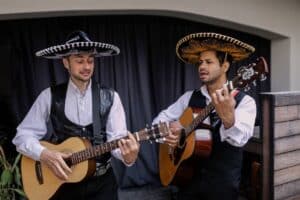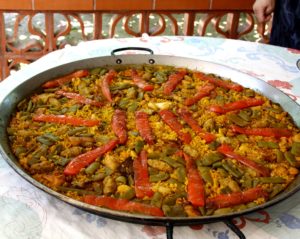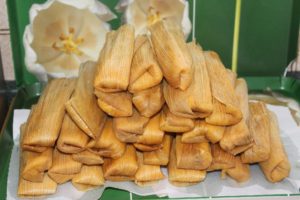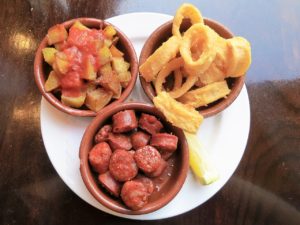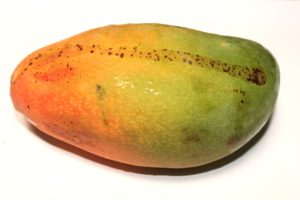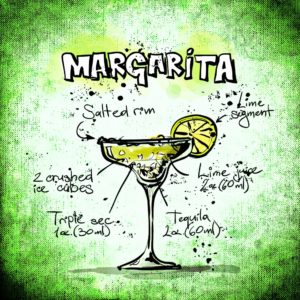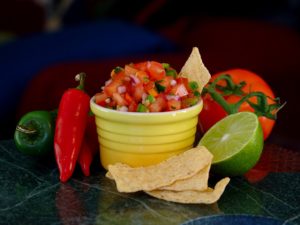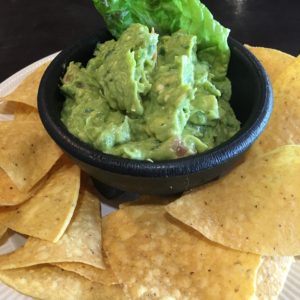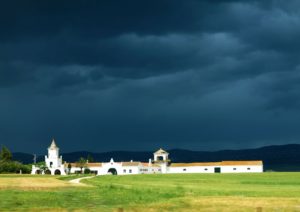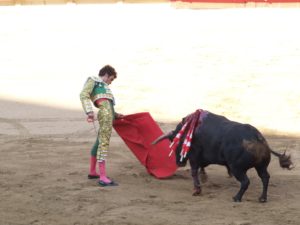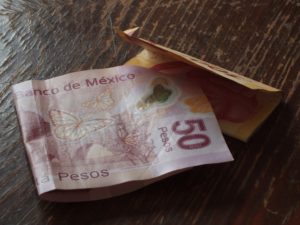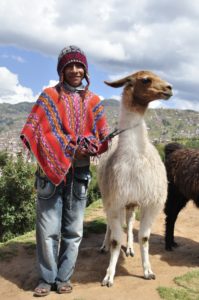When Spanish Words Become Our Own
Adopted and Borrowed Words Enrich English
Una alpaca. (An alpaca.).
Photo by Guido612; licensed via Creative Commons.
Rodeo, pronto, taco, enchilada — English or Spanish?
The answer, of course, is both. For English, like most languages, has expanded over the years through assimilation of words from other tongues. As people of different languages intermingle, inevitably some of the words of one language become words of the other.
It doesn’t take someone who studies etymology to look at a Spanish-language website (or the websites in nearly any other language) to see how English vocabulary, particularly as it relates to technical subjects, is spreading. And while English now may be giving more words to other languages than it is absorbing, that wasn’t always true. For the English vocabulary today is as rich as it is largely because it accepted words from Latin (mostly by way of French). But there’s also a small share of the English language that is derived from Spanish.
Words From Various Origins
Many Spanish words have come to us from three primary sources. As you can hypothesize from the list below, many of them entered American English in the days of Mexican and Spanish cowboys working in what is now the U.S. Southwest. Words of Caribbean origin entered English by way of trade. The third major source is food vocabulary, especially for foods whose names have no English equivalent, as the intermingling of cultures has expanded our diets as well as our vocabulary. As you can see, many of the words changed meaning upon entering English, often by adopting a narrower meaning than in the original language.
Spanish Words Assimilated Into English
Following is a list, by no means complete, of Spanish loanwords that have become assimilated into the English vocabulary. As noted, some of them were adopted into the Spanish language from elsewhere before they were passed on to English. Although most of them retain the spelling and even (more or less) the pronunciation of Spanish, they are all recognized as English words by at least one reference source.
A–B: Adios to Burro
- adios (from adiós)
- adobe (originally Coptic tobe, «brick»)
- aficionado
- albino
- alcove (from Spanish alcoba, originally Arabic al-qubba)
- alfalfa (originally Arabic al-fasfasah. Many other English words beginning with «al» were originally Arabic, and many may have had a Spanish-language connection in becoming English.)
- alligator (from el lagarto, «the lizard»)
- alpaca (animal similar to a llama, from Aymara allpaca)
- armada
- armadillo (literally, «the little armed one»)
- arroyo (English regionalism for «stream»)
- avocado (originally a Nahuatl word, ahuacatl)
- bajada (a geological term referring to a type of alluvial slope at the base of a mountain, from bajada, meaning «slope»)
- banana (word, originally of African origin, entered English via either Spanish or Portuguese)
- bandoleer (type of belt, from bandolera)
- barbecue (from barbacoa, a word of Caribbean origin)
- barracuda
- bizarre (some sources, not all, say this word came from the Spanish bizarro)
- bonanza (although the Spanish bonanza can be used synonymously with the English cognate, it more often means «calm seas» or «fair weather»)
- booby (from bobo, meaning «silly» or «selfish»)
- bravo (from either Italian or Old Spanish)
- bronco (means «wild» or «rough» in Spanish)
- buckaroo (possibly from vaquero, «cowboy»)
- bunco (probably from banco, «bank»)
- burrito (literally «little donkey»)
- burro
C: Cafeteria to Criollo
- cafeteria (from cafetería)
- caldera (geological term)
- canary (Old Spanish canario entered English by way of French canarie)
- canasta (the Spanish word means «basket»)
- cannibal (originally of Caribbean origin)
- canoe (the word was originally Caribbean)
- canyon (from cañón)
- cargo (from cargar, «to load»)
- castanet (from castañeta)
- chaparral (from chaparro, an evergreen oak)
- chaps (from Mexican Spanish chaparreras)
- chihuahua (dog breed named after Mexican city and state)
- chile relleno (Mexican food)
- chili (from chile, derived from Nahuatl chilli)
- chili con carne (con carne means «with meat»)
- chocolate (originally xocolatl, from Nahuatl, an indigenous Mexican language)
- churro (Mexican food)
- cigar, cigarette (from cigarro)
- cilantro
- cinch (from cincho, «belt»)
- cocaine (from coca, from Quechua kúka)
- cockroach (Two English words, «cock» and «roach,» were combined to form «cockroach.» It is believed, but isn’t certain, that the words were chosen because of their similarity to the Spanish cucaracha.)
- coco (type of tree, from icaco, originally Arawak ikaku from the Caribbean)
- comrade (from camarada, «roommate»)
- condor (originally from Quechua, an indigenous South American language)
- conquistador
- corral
- coyote (from the Nahuatl coyotl)
- creole (from criollo)
- criollo (English term refers to someone indigenous to South America; Spanish term originally referred to anyone from a particular locality)
D–G: Dago to Guerrilla
- dago (offensive ethnic term comes from Diego)
- dengue (Spanish imported the word from Swahili)
- desperado
- dorado (type of fish)
- El Niño (weather pattern, means «The Child» due to its appearance around Christmas)
- embargo (from embargar, to bar)
- enchilada (participle of enchilar, «to season with chili»)
- fajita (diminutive of faja, a belt or sash, probably so named due to strips of meat)
- fiesta (in Spanish, it can mean a party, a celebration, a feast — or a fiesta)
- filibuster (from filibustero, derived from Dutch vrijbuiter, «pirate»)
- flan (a type of custard)
- flauta (a fried, rolled tortilla)
- flotilla
- frijol (English regionalism for a bean)
- galleon (from Spanish galeón)
- garbanzo (type of bean)
- guacamole (originally from Nahuatl ahuacam, «avocado,» and molli, «sauce»)
- guerrilla (In Spanish, the word refers to a small fighting force. A guerrilla fighter is a guerrillero.)
H–L: Habanero to Llama
- habanero (a type of pepper; in Spanish, the word refers to something from Havana)
- hacienda (in Spanish, the initial h is silent)
- hammock (from jamaca, a Caribbean Spanish word)
- hoosegow (slang term for a jail comes from Spanish juzgado, participle of juzgar, «to judge»)
- huarache (type of sandal)
- hurricane (from huracán, originally an indigenous Caribbean word)
- iguana (originally from Arawak and Carib iwana)
- incomunicado
- jaguar (from Spanish and Portuguese, originally from Guarani yaguar)
- jalapeño
- jerky (the word for dried meat comes from charqui, which in turn came from the Quechua ch’arki)
- jicama (originally from Nahuatl)
- key (the word for a small island comes from the Spanish cayo, possibly of Caribbean origin)
- lariat (from la reata, «the lasso»)
- lasso (from lazo)
- llama (originally from Quechua)
M–N: Machete to Nopal
- machete
- machismo
- macho (macho usually means simply «male» in Spanish)
- maize (from maíz, originally from Arawak mahíz)
- manatee (from manatí, originally from Carib)
- mano a mano (literally, «hand to hand»)
- margarita (a woman’s name meaning «daisy»)
- mariachi (a type of traditional Mexican music, or a musician)
- marijuana (usually mariguana or marihuana in Spanish)
- matador (literally, «killer»)
- menudo (Mexican food)
- mesa (In Spanish it means «table,» but it also can mean «tableland,» the English meaning.)
- mesquite (tree name originally from Nahuatl mizquitl)
- mestizo (a type of mixed ancestry)
- mole (The name for this delightful chocolate-chili dish is sometimes misspelled as «molé» in English in an attempt to prevent mispronunciation.)
- mosquito
- mulatto (from mulato)
- mustang (from mestengo, «stray»)
- nacho
- nada (nothing)
- negro (comes from either the Spanish or Portuguese word for the color black)
- nopal (type of cactus, from Nahuatl nohpalli)
O–P: Ocelot to Punctilio
- ocelot (originally Nahuatl oceletl; the word was adopted into Spanish and then French before becoming an English word)
- olé (in Spanish, the exclamation can be used in places other than bullfights)
- oregano (from orégano)
- paella (a savory Spanish rice dish)
- palomino (originally meant a white dove in Spanish)
- papaya (originally Arawak)
- patio (In Spanish, the word most often refers to a courtyard.)
- peccadillo (from pecadillo, diminutive of pecado, «sin»)
- peso (Although in Spanish a peso is also a monetary unit, it more generally means a weight.)
- peyote (originally Nahuatl peyotl)
- picaresque (from picaresco)
- pickaninny (offensive term, from pequeño, «small»)
- pimento (Spanish pimiento)
- pinole (a meal made of grain and beans; originally Nahuatl pinolli)
- pinta (tropical skin disease)
- pinto (Spanish for «spotted» or «painted»)
- piñata
- piña colada (literally meaning «strained pineapple»)
- piñon (type of pine tree, sometimes spelled «pinyon»)
- plantain (from plátano or plántano)
- plaza
- poncho (Spanish adopted the word from Araucanian, an indigenous South American language)
- potato (from batata, a word of Caribbean origin)
- pronto (from an adjective or adverb meaning «quick» or «quickly»)
- pueblo (in Spanish, the word can mean simply «people»)
- puma (originally from Quechua)
- punctilio (from puntillo, «little point,» or possibly from Italian puntiglio)
Q–S: Quadroon to Stockade
- quadroon (from cuaterón)
- quesadilla
- quirt (type of riding whip, comes from Spanish cuarta)
- ranch (Rancho often means «ranch» in Mexican Spanish, but it can also mean a settlement, camp or meal rations.)
- reefer (drug slang, possibly from Mexican Spanish grifa, «marijuana»)
- remuda (regionalism for a relay of horses)
- renegade (from renegado)
- rodeo
- rumba (from rumbo, originally referring to the course of a ship and, by extension, the revelry aboard)
- salsa (In Spanish, almost any kind of a sauce or gravy can be referred to as salsa.)
- sarsaparilla (from zarza, «bramble,» and parrilla, «small vine»)
- sassafras (from sasafrás)
- savanna (from obsolete Spanish çavana, originally Taino zabana, «grassland»)
- savvy (from sabe, a form of the verb saber, «to know»)
- serape (Mexican blanket)
- serrano (type of pepper)
- shack (possibly from Mexican Spanish jacal, from the Nahuatl xcalli, «adobe hut»)
- siesta
- silo
- sombrero (In Spanish, the word, which is derived from sombra, «shade,» can mean almost any kind of hat, not just the traditional broad-rimmed Mexican hat.)
- spaniel (ultimately from hispania, the same root that gave us the words «Spain» and español)
- stampede (from estampida)
- stevedore (from estibador, one who stows or packs things)
- stockade (from a French derivation of the Spanish estacada, «fence» or «stockade»)
T–Z: Taco to Zapateado
- taco (In Spanish, a taco can refer to a stopper, plug or wad. In other words, a taco originally meant a wad of food. Indeed, in Mexico, the variety of tacos is almost endless, far more varied than the beef, lettuce and cheese combination of U.S.-style fast food.)
- tamale (The Spanish singular for this Mexican dish is tamal. The English comes from an erroneous backformation of the Spanish plural, tamales.)
- tamarillo (type of tree, derived from tomatillo, a small tomato)
- tango
- tejano (type of music)
- tequila (named after a Mexican town of the same name)
- tobacco (from tabaco, a word possibly of Caribbean origin)
- tomatillo
- tomato (from tomate, derived from Nahuatl tomatl)
- toreador
- tornado (from tronada, thunderstorm)
- tortilla (in Spanish, an omelet often is a tortilla)
- tuna (from atún)
- vamoose (from vamos, a form of «to go»)
- vanilla (from vainilla)
- vaquero (English regionalism for a cowboy)
- vicuña (animal similar to a llama, from Quechua wikuña)
- vigilante (from adjective for «vigilant»)
- vinegarroon (from vinagrón)
- wrangler (some sources say word is derived from Mexican Spanish caballerango, one who grooms horses, while other sources say the word comes from German)
- yucca (from yuca, originally a Caribbean word)
- zapateado (a type of dance emphasizing movement of the heels)
By
Last updated:
March 14, 2023
The following 35 Spanish words are more or less common in American English. They are used in Spanish almost every day, so if you are a native English speaker who wants to speak Spanish, it’s a good starting point!
Even if you already know these words, it is important to understand the differences in the way they are used between the two languages, especially if you ever plan on using them in Spanish!
Throughout this list you will be able to see and learn how we native Spanish speakers use (or don’t!) these words, and you will be given, when necessary, a quick explanation about the differences between the English and Spanish meanings. At the end of the post, you should know if you can use any one of these words in a Spanish-speaking environment or if you would do better to keep quiet.
All these words have approximately the same meaning and usage in Spanish and English nowadays.
Contents
- People
-
- 1. Aficionado
- 2. Alcalde
- 3. Amigo
- 4. Buckaroo
- 5. Caballero
- 6. Cannibal
- 7. Conquistador
- 8. Desperado
- 9. Matador
- 10. Peon
- Animals
-
- 11. Albatross
- 12. Burro
- 13. Zorro
- Clothing
-
- 14. Bandolier
- 15. Sombrero
- Places
-
- 16. Bodega
- 17. Hacienda
- Food and Drink
-
- 18. Cacao
- 19. Chorizo
- 20. Daiquiri
- 21. Oregano
- 22. Tapas
- 23. Vanilla
- 24. Yerba buena
- Music and Dance
-
- 25. Flamenco
- 26. Rumba
- 27. Tango
- Other
-
- 28. Fiesta
- 29. Siesta
- 30. Adobe
- 31. Corralito
- 32. Crusade
- 33. Galleon
- 34. Lolita
- 35. Telenovela
Download:
This blog post is available as a convenient and portable PDF that you
can take anywhere.
Click here to get a copy. (Download)
People
1. Aficionado
In English, it’s someone who is very interested in and enthusiastic about a particular subject. I have seen an increase in the use of this word in English lately. You used to have football fans, now you have sports aficionados.
What is funniest for me is the fact that in Spanish we more often use the word “fan” than aficionado.
2. Alcalde
Alcalde (mayor, magistrate) has a Spanish origin.
However, be careful where you utter it because it means “pimp” in Latin America!
3. Amigo
In English, amigo is used to address or refer to a friend predominantly in Spanish-speaking areas. Amigo comes from the Spanish word amigo, which comes from the Latin word amicus (friend), which is derived from the verb amare (to love). Maybe this is why we love everybody in Spain!
4. Buckaroo
The word buckaroo comes from Spanish vaquero (cowboy), which is a person who manages cattle while mounted on horseback. The word vaquero derived from the word vaca (cow), which was borrowed from Latin (vacca — cow).
5. Caballero
Caballero, which has the meaning of knight or gentleman in English, comes from the Spanish word caballero. A caballero is someone who rides a caballo (horse), caballo comes from the Latin caballus (horse).
6. Cannibal
In English, a cannibal is a person who eats the flesh of other human beings. Cannibal comes from the Spanish word caníbal, which is just a variation of the word caríbal, which in turn derives from the word Caribe (Caribbean, Carib).
7. Conquistador
Conquistador comes from Spanish conquistador, which is derived from conquista (conquest). Conquista was the result of borrowing the Latin word conquisita, which means conquest.
8. Desperado
Desperado is an adaptation of the Spanish word desesperado, which means desperate.
By the way, check out these Spanish-speaking singers and listen to Marta Sánchez’s song “Desesperada.” Sexy at its best!
9. Matador
Matador literally means “a person who kills.” It comes from the Spanish infinitive matar (to kill, to slaughter).
Curiously enough, people in Spain tend to avoid using the word matador. They normally say torero (bullfighter), which is basically a person who fights toros (bulls).
10. Peon
Peon comes from Spanish peón, which is used to describe any type of laborer. Imagine a person who has to work hard to earn their money, who comes home full of dirt and tired as a mug. There you have your peón.
Animals
11. Albatross
It’s a large white bird with long, strong wings that lives near the sea.
Arabic had the word al-gattas, which means “the diver.” From there, Spanish got the word alcatraz (gannet), which entered English as albatross. Then a weird thing happened, Spanish borrowed this word back from English, thus giving us our present-day Spanish albatros!
12. Burro
The Spanish burro derived from Latin burricus, which means “small horse.”
13. Zorro
Zorro comes from the Spanish zorro, which is fox. Foxes are known for being clever, and you can say of someone that they are un zorro because they are just too smart!
Clothing
14. Bandolier
The word bandolier comes from the Spanish bandolera, which is a band that crosses from one shoulder to the opposite hip where bandoleros used to put their weapons, and also bandolero (one who wears a bandolera, i.e., probably a bandit).
However, if you wear something across your chest nowadays, you say in Spanish llevar algo en bandolera (to carry across the shoulder).
15. Sombrero
The word sombrero comes from Spanish sombrero, which means, literally, “shade maker.” Easy!
Places
16. Bodega
Bodega comes from Spanish bodega (cellar), which derived from Latin-Greek aphotheca. It is interesting that the word aphotheca entered many other languages with the meaning of pharmacy (take as an example the Polish word apteka — pharmacy).
17. Hacienda
The word hacienda, meaning estate, comes from the Old Spanish word fazienda. There are a lot of Spanish words starting with h- that used to begin with f- in Old Spanish.
Food and Drink
18. Cacao
Cocoa comes from Spanish cacao, which derived from Nahuatl cacáhuatl. If you know some Spanish, you should recognize this word, since it has given us another, also delicious, food: el cacahuete (the peanut). Manteca de cacahuete (peanut butter), anyone?
19. Chorizo
A chorizo is a spiced pork sausage probably known worldwide.
That being said, there is another meaning of the word that is not so delicious. A chorizo is a thief, and it has been consistently used to describe some Spanish politicians in the past few years.
20. Daiquiri
Daiquiri comes from the name Daiquiri, a port city in Eastern Cuba.
Daiquiris contain rum, a lot of rum. Cuba’s most famous alcoholic drink is rum… I am just connecting some dots here.
21. Oregano
Oregano entered English via Spanish orégano, which means oregano or marjoram.
22. Tapas
The word tapas comes from the word tapar (to cover). Back in the Middle Ages, when you could not find a single tavern without flies, these little insects had a tendency to taste the drinks served. I guess they got drunk and died inside the beverage… Until one smart person thought it would be interesting to cover the glass with something in between sips. They started using a loaf of bread, then chorizo was added… You can imagine the rest.
If you want to know other curious facts about the origin of tapas, I recommend you visit this page.
23. Vanilla
Vanilla comes from Spanish vainilla, which in turn comes from Latin vaina (pod).
As you may already know, the Spanish suffix -illo/-illa is used as a diminutive, so a vainilla would be a small vaina.
24. Yerba buena
Yerba buena comes from Spanish yerbabuena, which, literally translated, means “good herb.”
Music and Dance
25. Flamenco
Flamenco is one of those music genres you either love or hate. Even people from the South of Spain, where flamenco originated, are divided into flamenco lovers and flamenco… not lovers.
The word flamenco is used to define a type of music and dance performed mainly by people of Gypsy origin. The word flamenco comes from the Middle Dutch word vlaminc (which means “from Flanders”), because in the past there was a theory that said Gypsies were of Germanic origin.
26. Rumba
Rumba comes from Spanish rumba, which is that impossible dance all my friends have mastered to perfection and I am not even able to describe.
If you like rumba, I really recommend you get familiar with the rumba catalana. I love it!
27. Tango
Tango is one of those sexy words the Spanish language has given the world. For free.
Whether you know how to dance a tango or not, just remember it is a word of Spanish origin. If you want to pronounce it correctly in Spanish, it should be said tan-goh.
Other
28. Fiesta
I still have not met a person in the whole world who does not know or has not heard about the word fiesta.
What is true is that the word fiesta entered English through Spanish. We also have fiesta (party), which comes from Latin festa.
29. Siesta
Siesta comes from Latin sexta hora (the sixth hour). The sixth hour refers to the prayer time at noon (six hours after dawn), but Spanish siesta starts after eating lunch, which can normally be 3 or 4 p.m.
If you are in Spain, bear in mind that most shops are closed during siesta time, which means if you need to buy something, you will have to wait until around 6 p.m.!
30. Adobe
Adobe is written exactly the same both in English and Spanish. Adobe comes from the Arabic word al-tob, which means something along the lines of “mud brick.”
There is one difference between the English and the Spanish, though: pronunciation. Remember that in Spanish we normally read words exactly how they are written, so we say ah-dóh-beh.
31. Corralito
Corralito comes from the Spanish word corral, which, like in English, is a pen or farmyard. Originally, the word corralito was used to define a closed playground where children could safely play without escaping.
However, the new definition of the word says that a corralito is a situation where a government closes the banks (the playground) so that money (the children) cannot be withdrawn (i.e., cannot escape).
32. Crusade
Crusade is a blend of the Middle French croisade and Spanish cruzado. Both words came from Latin crux, crucis (cross).
Maybe you can understand now why the Stations of the Cross, or the Way of the Cross, are called Via crucis, and how the word crusade has developed the meaning it has today from its place in history.
33. Galleon
Galleon comes from Spanish galeón, which is a large sailing ship with three or more masts.
It is interesting how the word in Spanish has its accent on the last syllable, while in English it is on the first one.
34. Lolita
I was so surprised when I discovered this word is actually of Spanish origin!
Lolita is the diminutive form of Lola, which in turn is short for Dolores (a female proper noun meaning “pains, sorrows”). That this word, closely related to religion, ended up meaning what it means today is strange to say the least.
35. Telenovela
The word telenovela is a fusion of two Spanish words: televisión (TV) and novela (novel). Watching a telenovela is indeed like watching a book be scenified on your TV. However, there is a difference between reading a novel and watching a telenovela. If you choose the latter, you can very well spend six months of your life waiting for the big climax to happen!
Nowadays, the word telenovela can also be used in Spanish to talk about people whose lives seem like a TV soap opera, full of drama, cliffhangers and love stories that can leave you breathless:
Su vida parece una telenovela. ¡Se ha divorciado 4 veces ya! (Her life looks like a telenovela. She has been divorced 4 times already!)
If you enjoy learning a new language with videos like telenovelas, you can try FluentU. FluentU is a language learning website and app that turns authentic, engaging video—like movie trailers, music videos, commercials and inspiring talks—into immersive lessons. All videos are curated specifically for language learners by language experts, so you don’t need to trawl the internet in search of truly authentic (and level-appropriate) videos. Plus, you can review what you learn in the videos with multimedia flashcards and personalized quizzes.
So there you have it. 35 super awesome words of Spanish origin that have traveled time and space and have landed in American English.
Download:
This blog post is available as a convenient and portable PDF that you
can take anywhere.
Click here to get a copy. (Download)
Continue Learning about Other Arts
What does the Spanish word a mean in English?
«A» is the Spanish word for «to».
What does the Spanish word modelo in English?
Spanish word modelo mean in English.
What does the spanish word quest mean in English?
quest is not a Spanish word.
What does the Spanish word alico mean in English?
alico is not a Spanish word.
What does zlaticko mean in Spanish?
This is not a word in English or Spanish.
As you study a foreign language, it is quite likely you will encounter words that have been borrowed from English. However, this process works both ways and English has also adopted a number of ‘loan’ words from foreign languages too. In fact, you probably use several of these words on a regular basis, without giving it much thought.
While these loan words come from various different languages, Spanish words feature prominently. Indeed, over the centuries, Spanish words have travelled all over the world, thanks to factors like Spanish colonialism, migration, the Hispanic influence on art and culture, and inventions and innovations with a Spanish origin.
For example, if something is invented in the English-speaking world, the inventor will typically name it and that chosen name will often be adopted by other languages too. The exact same thing happens if a piece of technology, or even an idea, originates in a Spanish-speaking region.
Spanish Words That Are Used in English
Below, we take a closer look at some of the most common examples of Spanish loan words used by English speakers, along with an explanation of the origin of the word. In each case, the word has retained its original spelling and has essentially become a recognised part of the English language, despite having its roots in Spanish.
1. Siesta
Although the concept of an afternoon nap is observed in a huge number of other countries, it is most closely associated with Spain and other cultures with a clear Hispanic link, such as the Philippines. The word itself means ‘nap’ and is used in various languages, including English, to describe the practice.
2. Plaza
The word ‘plaza’ roughly translates to ‘public square’ and has a prominent role in Hispanic culture. Most of the colonial cities in Spanish America and the Philippines were built around a square section, which would typically contain some of the most important buildings, such as law courts and administrative centres.
3. California
The largest state in the United States of America in terms of population, California shares a border with Mexico and has a fascinating history. It was previously part of the Spanish Empire’s ‘New Spain’ colony and briefly became part of Mexico during the 1800s. It is said to be named after a mythical island from a 16th century Spanish novel.
4. Guerrilla
Translating to ‘little war’, the word guerrilla is typically used to describe small groups of combatants using unconventional tactics to fight a larger, more conventional army. The phrase is believed to originate from the Peninsular War, where Spanish fighters fought against Napoleon’s forces.
5. Mosquito
It is believed that the word ‘mosquito’ actually has North American origin, with the first recorded usage occurring in the 16th century. However, the word itself is Spanish, translating to ‘little fly’. Its adoption is likely the result of European colonisation of the continent, which began in 1492 with a Spanish expedition led by Christopher Columbus.
6. Fiesta
The Spanish word for ‘festival’, it was originally used predominantly to describe religious celebrations in Spanish cultures, but is now often used by English speakers when referring to any festivities. The car manufacturer Ford also has a vehicle called the Ford Fiesta, which is one of its best-selling models.
7. Tequila
A popular drink all over the world, ‘Tequila’ is a drink of Mexican origin and its name has a very simple explanation. It was first created near the Mexican city of Tequila, Jalisco. During the 19th century, it began to be exported to the United States and its name was shortened from ‘Tequila Extract’ to ‘Tequila’.
8. Armada
The Spanish word for a naval fleet, the word ‘armada’ entered the English language during the 16th century, when a naval invasion was sent to England by Philip II of Spain. This is commonly referred to as the Spanish Armada and the word ‘armada’ is now used within the English language in a more general sense to refer to warships.
9. Macho / Machismo
Historically, the Spanish word ‘macho’ referred to the masculine role men were expected to play in Iberian cultures. The concept of ‘machismo’ made its way into other cultures through things like literature and the arts and is now used to describe a particular version of manliness, built on self-reliance and strength. In more recent times, the word has also developed negative connotations, being linked with ideas like male aggression and oppression of women.
10. Armadillo
Originating in South America, armadillos are mammals and are perhaps most notable for their leathery armoured shell, which offers them protection from predators. Given their geographical origin, it is perhaps little surprise that their name is derived from Spanish. In actual fact, it literally translates to ‘little armoured one’.
Spanish Words That SHOULD Be Used in English
In addition to the hundreds of Spanish words that have been adopted for usage within the English language, we have compiled a list of Spanish words that we believe should be adopted. All of these words currently have no direct English language equivalent and so are considered to be ‘untranslatable’.
| Anteayer | A singular word meaning ‘the day before yesterday’. |
| Sobremesa | The point at the end of a meal, after everyone has finished, but the conversation continues. |
| Enchilar | To become red in the face after eating food containing chilli |
| Vergüenza ajena | Shame or embarrassment felt on behalf of others, even if they do not feel it themselves. |
| Quincena | A period of 15 days; or the 15th day of the month, marking the halfway point. |
| Entrecejo | The hairless space in between the eyebrows. |
| Lampiño – imberbe | A man who either cannot grow facial hair, or has very sparse facial hair, which looks terrible. |
| Estrenar | To wear a new item of clothing or use a new purchase for the first time. |
| Te quiero | Used when you like someone as more than a friend, but do not quite ‘love’ them yet. |
It should be no surprise that English—particularly American English—has borrowed more than a few words from Spanish. Consider these facts:
1. The US-Mexico border is the most frequently crossed border in the world and nearly 2,000 miles long.
2. There are nearly 40 million Spanish-speaking US residents.
3. Puerto Rico, a US territory, is home to nearly 3.5 million Spanish speakers.
4. Much of the US once belonged to Mexico including significant portions of California, Texas, Arizona, New Mexico, Nevada, Colorado, Utah, and Wyoming.
So what does this mean for you? It means that you’re going to have to learn some English words and expressions that are actually Spanish.
Here are some terms you’re likely to come across.
Spanish expressions
It’s not just Spanish words that we use in English. We also use a handful of Spanish expressions.
Hasta la vista, Hasta luego (See you later)
Hasta mañana (See you tomorrow)
As an example, here is arguably the most famous movie line of the 1990’s.
Que sera, sera (Whatever will be, will be)
Though somewhat dated, we can use this expression to tell someone to accept a situation that can’t be changed. The expression became popular with the release of Doris Day’s hit song in 1956.
Mano a mano
We use this expression to communicate that two people (usually men) are engaged in a one-on-one competition or confrontation.
Mi casa es su casa (My house is your house, similar to the expression Make yourself at home)
Here is an example from the movie Pulp Fiction [CLIP CONTAINS PROFANITY]. John Travolta’s character, Vince, has just purchased heroin from his dealer and wants to know if he can consume the drugs in his dealer’s home. The dealer’s response is “Mi casa es su casa,” to which Vince replies “Muchas gracias” (Spanish for “Thank you very much”).
Food and drink
Dishes: taco, burrito, nachos, empanada, quesadilla, paella, tamales, tapas, and churro
Fruits, vegetables, and spices: mango, papaya, quinoa, jalapeño, cilantro, oregano
Alcoholic beverages: tequila, piña colada, margarita
Other terms: tortilla, pico de gallo, guacamole, chorizo
Animals
We use Spanish words for a variety of animals. Examples include burro, anaconda, alpaca, condor, iguana, mosquito, puma and armadillo.
Music
In English, we use the Spanish terms for latin music genres.
A well-known merengue song:
A well-known salsa song:
A well-known bachata song:
A well-known cumbia song:
A well-known tango song:
A well-known reggaeton song:
War and politics
An armada is a fleet of warships.
Conquistador means conqueror. We use the word to refer to a Spanish conqueror of the New World.
A junta is a military group that rules a country, usually after a revolution or overthrow of the government.
An embargo is a government order prohibiting trade with another nation.
A guerrilla is a member of a small military group, often fighting against a ruling power.
Geography and weather
A sierra is a mountain range with jagged peaks.
A mesa (Spanish for table) is a hill with a flat top, typical of the Southwestern United States.
El Niño (Spanish for The Boy) is a cyclical weather phenomenon caused by the warming of the Pacific Ocean. It causes changes in weather around the world.
Parties and celebrations
A fiesta is a party, celebration, or festive event.
A piñata is “a decorated paper container filled with sweets or toys. It is hung up at a party and children try to break it open with a stick.” (Longman English Dictionary)
A quinceañera is a celebration of a girl’s fifteenth birthday.
Cinco de Mayo (May 5th) is a Mexican holiday which celebrates the Mexican army’s victory over the French at the Battle of Puebla.
Additional words
Adobe refers to sun-dried clay bricks used in construction.
An aficionado is someone who is passionate about or greatly enjoys a certain activity or subject (an aficionado of wine, aficionado of fine food, etc.).
A barrio is a Spanish-speaking part of a city or town. The word has a negative connotation and is often used to talk about an impoverished area.
A bodega is a small convenience store or grocery store, often in a Spanish-speaking area.
A bonanza is “a lucky or successful situation in which people can make a lot of money.” (Longman English Dictionary)
A hacienda is a large farm, ranch, or estate in a Spanish-speaking country.
Hombre is the Spanish word for man. We sometimes use the word in English to talk about strong or tough men.
We use the term incommunicado to communicate that someone is in a situation in which communication with others is not possible.
We use Latino (for males) and Latina (for females) to refer to a native of Latin America or someone of Latin American origin.
Loco means crazy.
A machete is a long, heavy knife used in rural areas of Latin-America.
Machismo refers to the “traditional male behavior that emphasizes how brave, strong, and sexually attractive a man is.” (Longman English Dictionary)
Macho means “behaving in a way that is traditionally typical of men, for example being strong or brave, or not showing your feelings – used humorously or in order to show disapproval.” (Longman English Dictionary)
We can use mañana to mean tomorrow (the word’s literal translation) or to communicate that we will do something at a later time.
A maraca is a percussion instrument.
A matador is a bullfighter. It comes from the Spanish word for killer.
We can use the word nada instead of the word nothing.
A patio is a paved outdoor area often used for sitting, eating, or entertaining.
A peseta was the standard currency used in Spain before the Euro.
A peso is the unit of money used in Argentina, Chile, Colombia, Cuba, the Dominican Republic, Mexico, the Philippines, and Uruguay.
A plaza is a public square often in the center of a town or city. We also use this term as a synonym for shopping center.
A poncho is “a type of coat consisting of one large piece of cloth with a hole in the middle for your head.” (Longman English Dictionary)
We use the word pronto to mean quickly or right now. It means soon in Spanish.
A siesta is an afternoon nap.
A sombrero is a Mexican hat used to protect its wearer from the sun.
.
Besides the terms above, there are many other English words of Spanish origin. I’ve limited this post to terms that (a) you’re likely to encounter in English and (b) have not been significantly altered in form or pronunciation.
For a more complete list of Spanish-derived words, check out Wikipedia’s list of English words of Spanish origin.
Hasta luego.
(Images source: Pixabay)
Hi, I’m Brad. I’ve spent the last seven years teaching English and creating websites for English learners and teachers. I recently moved from Costa Rica to Orlando, Florida, where I teach intensive English classes at a state college. If you’d like to contact me, I can be reached via email at [email protected]




